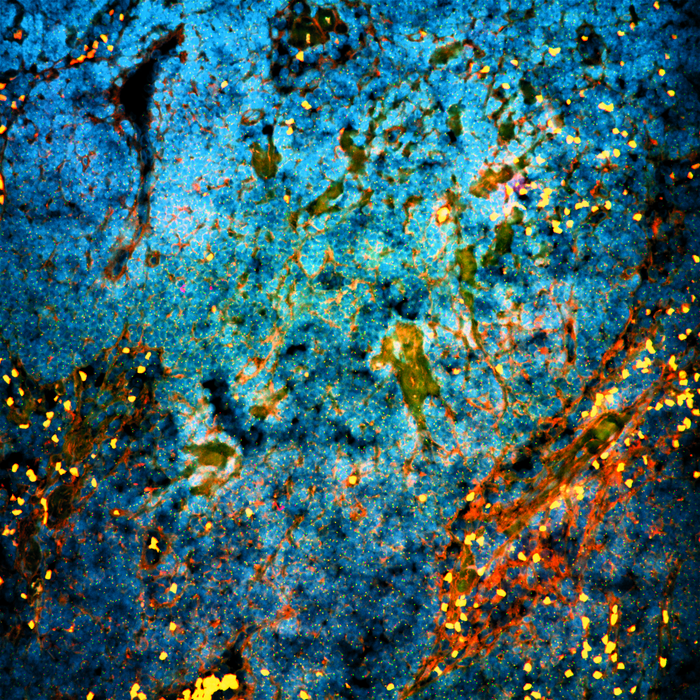Hormone therapy is successful at keeping metastatic prostate cancer under control, but eventually the tumor cells become resistant to it. An unexpected potential solution has now emerged in medicines not designed to fight cancer, but to target proteins that regulate a cell’s circadian rhythm.

Credit: Netherlands Cancer Institute
Hormone therapy is successful at keeping metastatic prostate cancer under control, but eventually the tumor cells become resistant to it. An unexpected potential solution has now emerged in medicines not designed to fight cancer, but to target proteins that regulate a cell’s circadian rhythm.
An international team of researchers led by the Netherlands Cancer Institute will publish this discovery June 27, 2022, in the renowned journal Cancer Discovery, a journal of the American Association for Cancer Research.
https://aacrjournals.org/cancerdiscovery/article/doi/10.1158/2159-8290.CD-21-0576/ (This link will work as soon as the article is posted).
————————————
Prostate cancer is a tumor type that develops under the influence of hormones, primarily testosterone. Patients with metastatic prostate cancer often receive treatment with anti-hormonal therapy, which inhibits the signal sent out by testosterone that stimulates tumor growth.
- Read more about hormone therapy for prostate cancer
Anti-hormonal therapy can keep prostate cancer under control, but eventually the cancer manages to progress despite ongoing treatment. The tumor cells have become resistant. This means that the greatest challenge in treating metastatic prostate cancer isn’t to find drugs that inhibit tumor growth itself, but to find drugs that can prevent resistance to hormonal therapy. The exact process of how tumor cells become resistant to hormone therapy, however, has been a mystery – until now.
An international research team led by scientists from the Netherlands Cancer Institute and Oncode Institute has made a surprising discovery using tissue from patients with prostate cancer who had been treated with testosterone-inhibiting drugs. They discovered that an unexpected class of proteins, namely proteins that normally regulate the circadian clock, dampens the effects of the anti-hormonal therapy. ‘Prostate cancer cells no longer have a circadian rhythm,’ says Wilbert Zwart, one of the research leaders. ‘But these ‘circadian clock’ proteins acquire an entirely new function in the tumor cells upon hormonal therapy: they keep these cancer cells alive, despite treatment. This has
never been seen before.’
‘Drug repurposing could save a decade or research’
Now that they have discovered the tumor’s escape route, the researchers will next work together with Oncode towards the development of novel strategies to block this process, and ultimately increase the efficacy of anti-hormonal therapy against prostate cancer even further.
Zwart: ‘Our discovery has shown us that we will need to start thinking outside the box when it comes to new drugs to treat prostate cancer and test medicines that affect the circadian clock proteins in order to increase sensitivity to hormonal therapy in prostate cancer. Fortunately, there are already several therapies that affect circadian proteins, and those can be combined with anti-hormonal therapies. This lead, which allows for a form of drug repurposing, could save a decade of research.’
The study was based on tissue from 56 patients with high-risk prostate cancer, who had received three months of anti-hormonal therapy before their surgery. After those three months, their tissue was examined at the DNA level. ‘We noticed that the genes keeping the tumor cells alive despite the treatment, were suddenly controlled by a protein that normally regulates the circadian clock,’ says researcher Simon Linder, who will receive his PhD for his research in this study. This surprising discovery also creates new opportunities, because inhibition of this circadian protein was found to further increase sensitivity to anti-hormonal therapy in prostate tumor cells in the lab as well as in mice.
The results of this study may lead to questions about whether disturbances to the body’s circadian clock, due to shift work for example, could increase the risk of therapy insensitivity in prostate cancer. ‘There is no evidence to support this’, medical oncologist André Bergman says. ‘The circadian rhythm in prostate tumor cells is no longer functional, and the proteins have taken on an entirely new role. This new escape route of the tumor cell has our full attention now, and follow-up research will show whether inhibition of this process can improve prostate cancer treatment.’
This research has been financially supported by KWF Dutch Cancer Society/Alpe d’Huzes and Oncode Institute.
More research stories:
- Metastatic prostate cancer hijacks DNA program for embryonic development | Netherlands Cancer Institute (nki.nl)
- New subtypes of prostate cancer discovered | Netherlands Cancer Institute (nki.nl)
Collaboration between the lab and the clinic:
- https://www.nki.nl/news-events/news/wilbert-zwart-and-andre-bergman-about-their-collaboration
- Oncode Institute – Why clinicians and fundamental researchers need each other
The Researchers and their groups
- Wilbert Zwart Group | Hormone-associated cancer | Netherlands Cancer Institute (nki.nl)
- Andre Bergman Group Leader | Oncogenomics | Netherlands Cancer Institute (nki.nl)
- Simon Linder | Netherlands Cancer Institute (nki.nl)
- Oncode Institute – Wilbert Zwart Group
Journal
Cancer Discovery
DOI
10.1158/2159-8290.CD-21-0576
Method of Research
Experimental study
Subject of Research
Human tissue samples
Article Title
Drug-induced epigenomic plasticity reprograms circadian rhythm regulation to drive prostate cancer towards androgen-independence
Article Publication Date
27-Jun-2022
COI Statement
W. Zwart, A.M. Bergman and H. van der Poel received research funding from Astellas Pharma B.V.
(Leiden, the Netherlands). No potential conflicts of interest were disclosed by the other authors.




